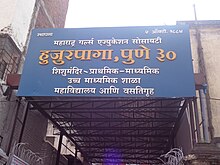R. G. Bhandarkar
Vice Chancellor of Bombay University | |
|---|---|
| In office 1893 - 1894 | |
| Preceded by | Kashinath Trimbak Telang |
| Succeeded by | N. G. Chandavarkar |
| Personal details | |
| Born | Ramkrishna Gopal Bhandarkar 6 July 1837 Knight Commander of Order of the Indian Empire |
| Signature | |
Sir Ramakrishna Gopal Bhandarkar
Early life
Ramakrishna Bhandarkar was born in
Career
Ramakrishna Bhandarkar taught at
As an educationist, he was elected to the
Social reformer
In 1853, while a student, Bhandarkar became a member of the Paramhansa Sabha, an association for furthering liberal ideas which was then secret to avoid the wrath of the powerful and orthodox elements of contemporary society.[2] Visits from Keshub Chandra Sen during 1864 had inspired the members of the Sabha.
Prarthana Samaj
In 1866, some of the members held a meeting at the home of Atmaram Pandurang and publicly pledged to certain reforms, including:[citation needed]
- Denunciation of the caste system
- encouragement of widow remarriage
- encouragement of female education
- abolition of child marriage.
The members concluded that religious reforms were required as a basis for social reforms. They held their first prayer meeting on 31 March 1867, which eventually led to the formation of the
Girls' education

In 1885, Bhandarkar along with noted social reformers Vaman Abaji Modak, and
Selected works
- Bhandarkar, R. G. (1913). Vaiṣṇavism, Śaivism and Minor Religious Systems. Grundriss der indo-arischen Philologie und Altertumskunde, 3.6. Strassburg: Trübner.
Legacy
- The Bhandarkar Oriental Research Institute in Pune is named after him.[12]
References
- ^ P. R. Dubhashi (2000). Building up a new university. p. 45.
The Saraswat Samaj has been traditionally cosmopolitan. It has produced great people like Ramakrishna Bhandarkar after whom the Bhandarkar Research Institute of Oriental Studies of Poona has been named
- ^ a b "Ramkrishna Gopal Bhandarkar - orientalist par excellence". The Times of India. 12 July 2003.
- ISBN 978-0-19-569787-2.
- ^ "India- Governor General Council". Parliamentary Debates (Hansard). 21 July 1908. Retrieved 5 April 2011.
- ^ Tikekar, Aroon and Tikekara, Aruna (2006), The Cloister's Pale: A Biography of the University of Mumbai, page 27, Popular Prakashan, Mumbai, India
- ^ Ghurye, G. S. (1954). Social Change in Maharashtra, II. Sociological Bulletin, page 51.
- ISBN 978-8125021926. Retrieved 12 September 2016.
- ^ "Huzurpaga". Huzurpaga.
- ISBN 978-8125021926. Retrieved 12 September 2016.
- ^ Rao, P.V., 2008. Women's Education and the Nationalist Response in Western India: Part II–Higher Education. Indian Journal of Gender Studies, 15(1), pp.141-148.
- ^ Rao, P.V., 2007. Women's Education and the Nationalist Response in Western India: Part I-Basic Education. Indian Journal of Gender Studies, 14(2), p.307.
- ^ http://www.bori.ac.in/ Bhandarkar Oriental Research Institute
